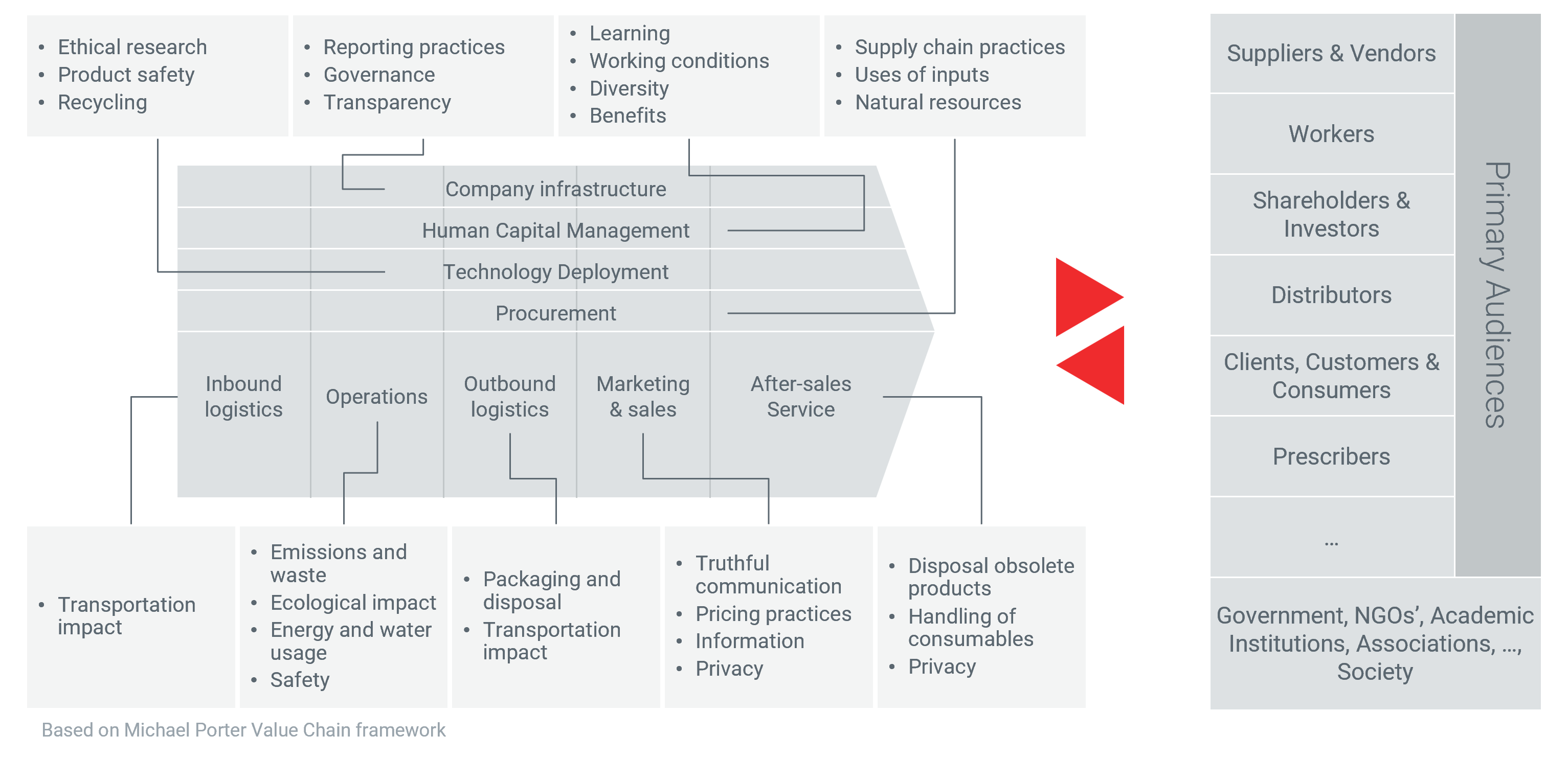By Lucia Böhles, Evan Müller, Leonardo Barbini and Louise Corneille | Bachelor in Management -BSc- Programme, ESCP Business School | Edited by Komoneed
Chapter One, Environmental Impact on the Automotive Value Chain
The automotive industry is a dynamic and ever-evolving sector, with numerous car brands striving to stay ahead of the competition. In Germany, Austria, and Switzerland -known collectively as DACH- several prominent car brands have established themselves as leaders within this region.
By exploring the way BMW, Mercedes-Benz and VW operate, we are able to discover certain aspects which impact on their sustainability and environmental performance.
This first chapter presents the general framework of a series that includes three more articles which will discuss in detail each of the analysed car manufacturers.
The DACH Automobile Sustainable Value Chain
This research is based on Michael Porter’s Value Chain framework.

Students from ESCP Business School -BSc Programme- have conducted this research of the value chains of Mercedes-Benz, Volkswagen -VW-, and BMW, analysing their various production stages such as resource acquisition, material sourcing, and other processes involved. Through this analysis we have gained a comprehensive insight into these companies’ operations.
Mercedes-Benz, Volkswagen, and BMW have each demonstrated their dedication to innovation, quality, and sustainability throughout all stages of their value chains. They prioritize Infrastructure investment in cutting-edge manufacturing facilities and research centres; human resource management has enabled the creation of inclusive workforces with diverse talent pools; technology advancements have continued to push safety, performance and efficiency boundaries while investing in sustainable vehicle technologies.
Lastly, these companies have consistently shown leadership through investments that promote diversity within their ranks.
Procurement and logistics are integral elements in all three brands’ value chains, with each prioritizing responsible sourcing, efficient supply chain management, and eco-friendly transportation methods. Their operations are marked by high degrees of automation and precision to guarantee high-quality vehicles that meet their stringent criteria.
Marketing and sales strategies have been tailored to create strong brand identities, customer loyalty, and improved sales performance in an increasingly competitive automotive market. Their expansive networks of dealerships and showrooms provide customers with immersive experiences while well-trained sales personnel cater to the individual needs and preferences of discerning clients.
Mercedes-Benz, Volkswagen, and BMW have prioritized exceptional customer service by investing in comprehensive training programs for their employees to guarantee they are knowledgeable about the newest models, features, innovations as well as skilled communicators and problem solvers.
Overall, this analysis provides a useful reference for comprehending the intricate processes behind vehicle production and provides insights on how other car brands could enhance their value chain operations.
Although there is still work to be done, by following their examples, companies can strive for excellence across all elements of their value chains, ultimately leading to success and expansion within the global and effervescent automotive industry.
Detailed Articles
- Environmental Impact of BMW, Mercedes-Benz, and VW in DACH
- BMW Sustainable Value Chain Analysis
- Mercedes-Benz Sustainable Value Chain Analysis
- Volkswagen Group Sustainable Value Chain Analysis
Sources
- BMW-Group-Lobbying-Policy-March-2021.pdf (bmwgroup.com)
- BMW Leadership and BMW Organizational Infrastructure – Research-Methodology
- More sustainable logistics at the BMW Group
- Sustainability | Volkswagen Group (volkswagen-group.com)
- VW Group Homepage
- From mine to factory: Volkswagen makes supply chain transparent with blockchain | Volkswagen Newsroom
- Intelligent supply and transportation control at the VW Group (eurolog.com)
- Human rights in the supply chain | Mercedes-Benz Group > Sustainability > Human rights > Supply Chain
- Sustainable supply chain management at Daimler | Mercedes-Benz Group
- Mercedes-Benz Launches Sustainable Supply Chain Initiative for EV Battery Sourcing – ESG Today
- Mercedes-Benz AG and Hydro partner for sustainable aluminium supply chain – Just Auto (just-auto.com)
Images
- Moerschy in Pixabay
- Rezaqorbani in Pixabay
- Daniel Andraski in Pexel
- Cottonbro Studio in Pexel
- Andrea Piacquadio in Pexels





after reading those articles, I never knew BMW, Mercedes-Benz, and VW had such a huge environmental impact in DACH! We need greener cars ASAP!
While its true that car manufacturers have an impact, blaming them solely wont solve the problem. We all need to take responsibility for our choices and push for greener alternatives. Its a collective effort, not just the car companies.
I never knew the impact of BMW, Mercedes-Benz, and VW in DACH was so massive! Mind-blowing stats!
Actually, its not that surprising. BMW, Mercedes-Benz, and VW have long dominated the DACH region. Their success is a result of consistent quality, innovative technology, and strong brand recognition. Its no wonder their impact is massive.
Who knew cars could have such a big impact on the environment? Time to rethink our rides, peeps! 🌍🚗
Are you serious? Cars have been known to contribute to pollution for years now. Its not some groundbreaking revelation. Maybe its time to catch up on the news and think before you comment. 🙄
I get your concern, but lets not forget that these car giants also have the power to invest heavily in greener technologies and shape the future of transportation. Instead of writing them off completely, lets hold them accountable and push for positive change together. 🌍🌱
Well, its about time you woke up to the reality. These luxury car brands have been contributing to environmental degradation for years. Its high time we hold them accountable and demand greener alternatives. No more turning a blind eye.
cant believe BMW, Mercedes-Benz, and VW are ruining the environment in DACH! Who knew?
Actually, its not just those companies. The entire automotive industry contributes to environmental issues. Blaming only a few brands wont solve the problem. We all need to work together to find sustainable solutions.
Who knew cars could be so eco-friendly? BMW, Mercedes-Benz, and VW are changing the game!
Hey there! Its a valid concern. While some car brands are making efforts to be more environmentally friendly, others still have a long way to go. Its important to keep pushing for greener alternatives and hold them accountable for their impact on our planet.
Who would have thought that BMW, Mercedes-Benz, and VW could have such an interesting environmental impact? 🌍
Well, its not really surprising if you think about it. Big car brands often have a significant environmental impact. Its up to them to prioritize sustainability and make a change. Lets hope they step up their game and contribute to a greener future.
Well, I never would have guessed that BMW, Mercedes-Benz, and VW had such a huge environmental impact! Who knew? 🚗🌍💥
Who knew cars could have such a big impact on the environment? Mind blown! 🌍🚗